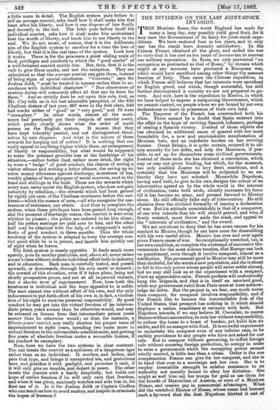THE DIVIDEND ON THE LAST JOINT-STOCK INVASION.
THIS Mexican fiasco, the worst England has made for many a long day, may possibly yield good fruit, for it may cure the Government of its fancy for joint-stock expe- ditions. We have endured four in ten years, and in only one has the result been decently satisfactory. In the Crimea France obtained all the glory, and ended the war so early that it has cost us ten years of income-tax to recover our military reputation. In Syria, we only prevented "an occupation as protracted as that of Rome," by threats which might at any moment have produced a European war, which would have sacrificed among other things the nascent freedom of Italy. Then came the Chinese expedition, in which France still believes that her interests were sacrificed to English greed, and which, though successful, has still further disintegrated a country we are not prepared to go- vern. And now, here is the expedition to Mexico, in which we have helped to impose a conquering Government, which we cannot control, on people whom we are bound by our own declarations to leave in possession of their own land. The Emperor of the French has overreached both his allies. There cannot be a doubt that Spain entered into the affair in the hope of reviving Spanish influence, perhaps of seating a Spanish viceroy. Instead of those objects she has obtained an additional cause of quarrel with her most formidable foe, a new and unmistakable manifestation of Mexican hate, and an indefinite burden on her reviving finance. Great Britain, it is quite certain, entered it to ob- tain security for her debts, and help the Mexicans, if pos- sible, to set up for themselves some civilized governments. Instead of those ends she has obtained a convention, which may or may not prove binding, but which, for the moment, has only enabled Juarez to levy fresh exactions, and a certainty that the Mexicans will be subjected to an au- thority they have not selected. Meanwhile Napoleon, having used both, to give to his own designs the colour of an. intervention agreed on by the whole world in the interest of civilization, casts both aside, silently increases his force ti tl it has become an army, and presses forward to Mexico alone. He still officially talks only of intervention. He still abstains from the civilized formality of issuing a declaration of war. But his attitude unmistakably is that of a conqueror, of one who intends that his will should prevail, and who, if firmly resisted, must throw aside the mask, and appeal to the " interests of civilization," and the sword.
We are not about to deny that he has some excuse for his conduct to Mexico, though he can have none for dissembling with his own useful allies. Mexico has over and over again given France cause of war. So exceptionally wretched, too, is her own condition, so complete the contempt of successive Go- vernments for the most solemn treaties, that Europe can look on punishment, even though it involve conquest, almost as a retribution. The permanent good to Mexico may still be more than doubtful, for she wants a new population, and she is about to fall to the only power whose people will never settle abroad, but we may still look on at the experiment with a resigned, if not an appreciative calm. French prefects will undoubtedly hang the brigands, and that is in itself an unmixed good, while any government ruled from Paris must at least acknow- ledge its debts. But the project is, we fear, one much worse than conquest, for conquest involves responsibility, and if the French like to become the irreconcilable foes of the United States, that prospect has nothing in it which should displease a nation sometimes at variance with both. But Napoleon intends, if we may believe M. Chevalier, to coerce Mexico without annexation, to rule her without responsibility, to reduce the horse to a beast of burden, yet build him no stable, and fill no manger with food. It is an awful experiment to undertake the conquest even of any inferior race, to be earthly providence to any people who have not asked for our rule. But to conquer without governing, to inflict foreign rule without securing foreign protection, to occupy in order to raise a government which the occupying power cannot wholly control, is little less than a crime. Order is the one compensation France can give for her conquest, and she is to hand that over to a sovereign not her own. She is to employ irresistible strength to subdue resistance to an authority not morally bound to obey her dictation. She might as well hire out her troops for gold as use them for the benefit of Maximilian of Austria, or even of a Mexican Prince, and receive pay in commercial advantages. What did the wretched Elector of Hesse, whose name had become such a by-word that the first Napoleon blotted it out of G'ermany as a discredit to civilization, do more? France may make a new India of Mexico without much injury to the world, and with benefit to the Mexicans, but we protest against a repetition, on a great scale, of the scene now enacted at Rome, where a weakly, corrupt Government, is maintained by French bayonets in a position to legalize brigandage, and give oppression a colour of right. It is a curious proof of the freedom which we are told exists in France that neither papers nor Chamber discuss this 31Iexican expedition. France has never commenced a mightier undertaking. Mexico is as large as the Southern States, with a society utterly dislocated, a population made up of irreconcilable races, and an organization which in itself is al- most fatal to any centralized power. Whether France keeps Mexico herself, or transfers it to an Archduke, she will have as much to accomplish as we have undertaken in India, where, if we have thirty times the population, we have no mighty enemy on our frontier. In either case she iucurs either the certainty of humiliation or obligations which will outlive the century, and the risk and the harden are both encountered without one word of debate.































 Previous page
Previous page